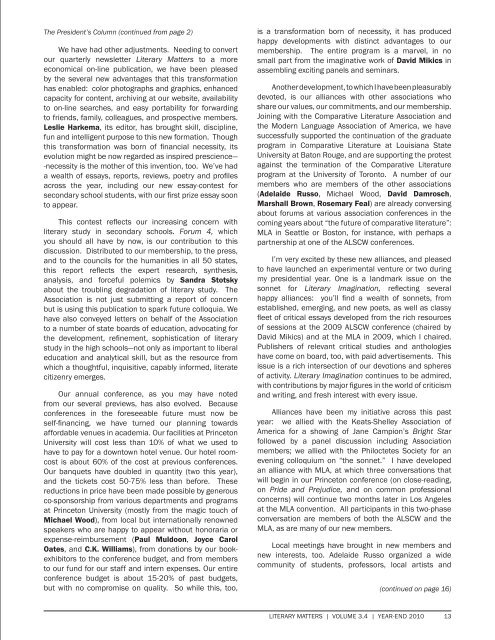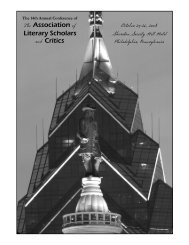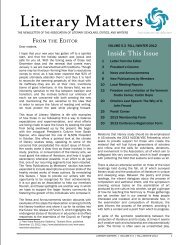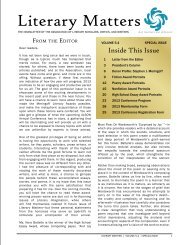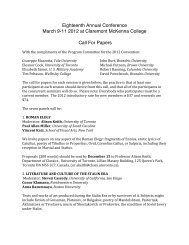Literary Matters - Association of Literary Scholars, Critics, and Writers
Literary Matters - Association of Literary Scholars, Critics, and Writers
Literary Matters - Association of Literary Scholars, Critics, and Writers
You also want an ePaper? Increase the reach of your titles
YUMPU automatically turns print PDFs into web optimized ePapers that Google loves.
The President’s Column (continued from page 2)We have had other adjustments. Needing to convertour quarterly newsletter <strong>Literary</strong> <strong>Matters</strong> to a moreeconomical on-line publication, we have been pleasedby the several new advantages that this transformationhas enabled: color photographs <strong>and</strong> graphics, enhancedcapacity for content, archiving at our website, availabilityto on-line searches, <strong>and</strong> easy portability for forwardingto friends, family, colleagues, <strong>and</strong> prospective members.Leslie Harkema, its editor, has brought skill, discipline,fun <strong>and</strong> intelligent purpose to this new formation. Thoughthis transformation was born <strong>of</strong> financial necessity, itsevolution might be now regarded as inspired prescience—-necessity is the mother <strong>of</strong> this invention, too. We’ve hada wealth <strong>of</strong> essays, reports, reviews, poetry <strong>and</strong> pr<strong>of</strong>ilesacross the year, including our new essay-contest forsecondary school students, with our first prize essay soonto appear.This contest reflects our increasing concern withliterary study in secondary schools. Forum 4, whichyou should all have by now, is our contribution to thisdiscussion. Distributed to our membership, to the press,<strong>and</strong> to the councils for the humanities in all 50 states,this report reflects the expert research, synthesis,analysis, <strong>and</strong> forceful polemics by S<strong>and</strong>ra Stotskyabout the troubling degradation <strong>of</strong> literary study. The<strong>Association</strong> is not just submitting a report <strong>of</strong> concernbut is using this publication to spark future colloquia. Wehave also conveyed letters on behalf <strong>of</strong> the <strong>Association</strong>to a number <strong>of</strong> state boards <strong>of</strong> education, advocating forthe development, refinement, sophistication <strong>of</strong> literarystudy in the high schools—not only as important to liberaleducation <strong>and</strong> analytical skill, but as the resource fromwhich a thoughtful, inquisitive, capably informed, literatecitizenry emerges.Our annual conference, as you may have notedfrom our several previews, has also evolved. Becauseconferences in the foreseeable future must now beself-financing, we have turned our planning towardsaffordable venues in academia. Our facilities at PrincetonUniversity will cost less than 10% <strong>of</strong> what we used tohave to pay for a downtown hotel venue. Our hotel roomcostis about 60% <strong>of</strong> the cost at previous conferences.Our banquets have doubled in quantity (two this year),<strong>and</strong> the tickets cost 50-75% less than before. Thesereductions in price have been made possible by generousco-sponsorship from various departments <strong>and</strong> programsat Princeton University (mostly from the magic touch <strong>of</strong>Michael Wood), from local but internationally renownedspeakers who are happy to appear without honoraria orexpense-reimbursement (Paul Muldoon, Joyce CarolOates, <strong>and</strong> C.K. Williams), from donations by our bookexhibitorsto the conference budget, <strong>and</strong> from membersto our fund for our staff <strong>and</strong> intern expenses. Our entireconference budget is about 15-20% <strong>of</strong> past budgets,but with no compromise on quality. So while this, too,is a transformation born <strong>of</strong> necessity, it has producedhappy developments with distinct advantages to ourmembership. The entire program is a marvel, in nosmall part from the imaginative work <strong>of</strong> David Mikics inassembling exciting panels <strong>and</strong> seminars.Another development, to which I have been pleasurablydevoted, is our alliances with other associations whoshare our values, our commitments, <strong>and</strong> our membership.Joining with the Comparative Literature <strong>Association</strong> <strong>and</strong>the Modern Language <strong>Association</strong> <strong>of</strong> America, we havesuccessfully supported the continuation <strong>of</strong> the graduateprogram in Comparative Literature at Louisiana StateUniversity at Baton Rouge, <strong>and</strong> are supporting the protestagainst the termination <strong>of</strong> the Comparative Literatureprogram at the University <strong>of</strong> Toronto. A number <strong>of</strong> ourmembers who are members <strong>of</strong> the other associations(Adelaide Russo, Michael Wood, David Damrosch,Marshall Brown, Rosemary Feal) are already conversingabout forums at various association conferences in thecoming years about “the future <strong>of</strong> comparative literature”:MLA in Seattle or Boston, for instance, with perhaps apartnership at one <strong>of</strong> the ALSCW conferences.I’m very excited by these new alliances, <strong>and</strong> pleasedto have launched an experimental venture or two duringmy presidential year. One is a l<strong>and</strong>mark issue on thesonnet for <strong>Literary</strong> Imagination, reflecting severalhappy alliances: you’ll find a wealth <strong>of</strong> sonnets, fromestablished, emerging, <strong>and</strong> new poets, as well as classyfleet <strong>of</strong> critical essays developed from the rich resources<strong>of</strong> sessions at the 2009 ALSCW conference (chaired byDavid Mikics) <strong>and</strong> at the MLA in 2009, which I chaired.Publishers <strong>of</strong> relevant critical studies <strong>and</strong> anthologieshave come on board, too, with paid advertisements. Thisissue is a rich intersection <strong>of</strong> our devotions <strong>and</strong> spheres<strong>of</strong> activity. <strong>Literary</strong> Imagination continues to be admired,with contributions by major figures in the world <strong>of</strong> criticism<strong>and</strong> writing, <strong>and</strong> fresh interest with every issue.Alliances have been my initiative across this pastyear: we allied with the Keats-Shelley <strong>Association</strong> <strong>of</strong>America for a showing <strong>of</strong> Jane Campion’s Bright Starfollowed by a panel discussion including <strong>Association</strong>members; we allied with the Philoctetes Society for anevening colloquium on “the sonnet.” I have developedan alliance with MLA, at which three conversations thatwill begin in our Princeton conference (on close-reading,on Pride <strong>and</strong> Prejudice, <strong>and</strong> on common pr<strong>of</strong>essionalconcerns) will continue two months later in Los Angelesat the MLA convention. All participants in this two-phaseconversation are members <strong>of</strong> both the ALSCW <strong>and</strong> theMLA, as are many <strong>of</strong> our new members.Local meetings have brought in new members <strong>and</strong>new interests, too. Adelaide Russo organized a widecommunity <strong>of</strong> students, pr<strong>of</strong>essors, local artists <strong>and</strong>(continued on page 16)LITERARY MATTERS | VOLUME 3.4 | YEAR-END 2010 13


